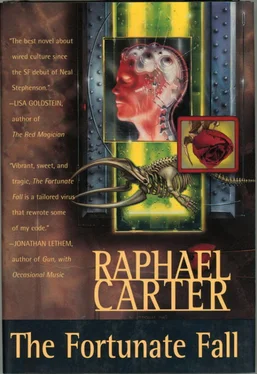Raphael Carter - The Fortunate Fall
Здесь есть возможность читать онлайн «Raphael Carter - The Fortunate Fall» весь текст электронной книги совершенно бесплатно (целиком полную версию без сокращений). В некоторых случаях можно слушать аудио, скачать через торрент в формате fb2 и присутствует краткое содержание. Город: New York, Год выпуска: 1996, ISBN: 1996, Издательство: Tor Books, Жанр: Киберпанк, на английском языке. Описание произведения, (предисловие) а так же отзывы посетителей доступны на портале библиотеки ЛибКат.
- Название:The Fortunate Fall
- Автор:
- Издательство:Tor Books
- Жанр:
- Год:1996
- Город:New York
- ISBN:0-312-86034-X
- Рейтинг книги:3 / 5. Голосов: 1
-
Избранное:Добавить в избранное
- Отзывы:
-
Ваша оценка:
- 60
- 1
- 2
- 3
- 4
- 5
The Fortunate Fall: краткое содержание, описание и аннотация
Предлагаем к чтению аннотацию, описание, краткое содержание или предисловие (зависит от того, что написал сам автор книги «The Fortunate Fall»). Если вы не нашли необходимую информацию о книге — напишите в комментариях, мы постараемся отыскать её.
“Gripping…. One of the most promising SF debuts in recent years”.
—“Publisher’s Weekly” starred review
The Fortunate Fall — читать онлайн бесплатно полную книгу (весь текст) целиком
Ниже представлен текст книги, разбитый по страницам. Система сохранения места последней прочитанной страницы, позволяет с удобством читать онлайн бесплатно книгу «The Fortunate Fall», без необходимости каждый раз заново искать на чём Вы остановились. Поставьте закладку, и сможете в любой момент перейти на страницу, на которой закончили чтение.
Интервал:
Закладка:
“Is that all?”
“No. I also want every scrap of information you can dig up on Voskresenye. Go over the interview with a fine-toothed comb and do a search on every word he used, apart from ‘and’ and ‘if.’ Anything you can dig up on Derzhavin, on the Andersons, especially on Catharine Anderson—I know most of it’s probably on the chip you gave me, but I need to be sure.”
“Sounds like a long night. Should I order in pasta or something?”
“I’m sick and tired of makarony, ” I said. “What are you in the mood for—dim sum or Ethiopian?”
She shrugged. “Up to you. I’ll be eating train food, remember?”
“Oh, right,” I said sheepishly. “In that case, which of those two will make you the least envious if I eat it in front of you?”
She smiled. “I’ve never been much for African food. Ironically.”
“Ironically,” I echoed. “Ethiopian it is.” I was about to touch the videophone when she said, “Let me do it.” I shrugged assent; her eyes unfocused for a second. “Done.”
“That fast? OK, let’s start with—”
The doorbell rang. My house, unlike my car, does not have weapons hidden in its every crevice, so my first thought was of kitchen knives and cast-iron skillets; my second, of escape routes.
“Don’t panic,” Keishi said. “It’s just your food.”
I went to the door and looked through the peephole, cringing a little as I did. It was rumored that the Weavers would use infrared to watch you approach the door, and then, as you squinted to see who it was, fire a bullet through the glass into your eye. The fear was irrational, I knew; they usually gave the Postcops a chance at you first, and the Postcops would consider such a tactic impolite. But the thought made me uncomfortably aware of the shape of my eyes in my head, and their softness. Somehow you think of eyes as being as shallow as almonds, but of course they’re not; they go back deep, and press against the brain’s gray labyrinths. The feeling persisted as I opened the door on the bored and impatient delivery boy, and made me reluctant to allow his retinal scan.
“I can’t give you your food without a scan, tavarishcha. Regulations.” He balanced the stack of boxes on his shoulder, obviously prepared to wait.
I submitted my eye to be lasered, and paid all in green out of sheer irritation. “Is that all, or do you want a blood test?”
“So take it up with management.”
I slammed the door in his face. Punk. “Keishi, do I want to know how you did that?”
“I just found the nearest unit and switched addresses.”
“Didn’t your mother ever teach you it’s wrong to steal?”
“So who stole?” she said. “You paid for it, didn’t you?”
“I guess that’s true,” I admitted. The smell of food had made my salivary glands spurt to life, with a stab of pain far more compelling than the pangs of conscience. I sat down on the couch and started opening boxes. “You’re sure you don’t mind my eating in front of you?”
“What are my chances of stopping you?” she said, smiling. “No, relax, I’m not hungry anyway.”
“Thanks,” I said, and proceeded. She watched me closely as I tore off a piece of crepe and used it to scoop up mashed chickpeas.
“You’re staring,” I said. “I thought you weren’t hungry.”
“I’m not. It’s just that you’re eating with your right hand.”
“That’s how you eat Ethiopian food,” I said, capturing a blob of umber curry.
“How come?”
I fanned my mouth instead of answering; the lentils had been too hot. When my tear ducts stopped firing, I said, “The left hand used to be considered unclean.”
“Like a taboo?”
I paused with a bite halfway to my mouth. “Um… no, just basic hygiene, actually. I think it goes back to before they had toilet paper. Could we talk about this when I’m not eating?”
“Huh? Oh, sure.”
I looked at the crepeful of vegetables suspiciously, then thrust all associations from my mind and swallowed it.
She couldn’t let the topic go. “You know,” she marveled, “I never would have thought of something like that.”
“Typical wirehead,” I said between mouthfuls. “You’ve spent so much time on the Net you’ve forgotten you have a digestive tract.”
“Yeah?” she said, raising an eyebrow. “Okay, Miss Earthier-than-thou, when was the last time you cooked a meal that didn’t come in a box?”
“I’m a camera,” I said. “I’m all over the country. I don’t have time to shop.”
“All right, then, when was the last time you ate? Not since yesterday, I’ll bet.”
“I had something for breakfast.”
“Something solid?”
“All right, Mirabara, you’ve made your point.”
“You know,” she said, pressing her advantage, “I think you’d maintain the Net against someone who preferred the body, and the body against someone who preferred the Net. You don’t seem to have much use for either one.”
“And what does that leave?”
“You tell me.”
“Look, as fascinating as this is,” I said, using a stray chopstick from the day before to mix the bland chickpeas into the overspiced lentils, “we’ve got about fourteen hours before I have to get on the train to Arkhangelsk, and in that time I have to get ready for the biggest interview of my life. This strikes me as more important than a lecture on nutrition. Can we leave it for another time?”
She sighed slightly and stood very straight, as though at attention. I wondered briefly whether she was making fun of me. “All right,” she said. “Where do we start?”
“Let’s see what we can find on Voskresenye himself.”
We spent several fruitless hours in search of data. Every time we caught hold of a thread, it would wind around and around the Net, until finally at the end we found his name, Net address, police record, dates of birth and death—and nothing more. Finally we gave up and started tracking down the people and things he’d referred to during our first interview. Catharine Anderson, we found, went missing during her senior year at MGU. A few days before that, Edward Sinclair drove his truck into the Volga River in an apparent suicide, which was later reclassified as a terrorist strike. Dr. Aleksandr Derzhavin, a Russian scientist who had collaborated with the Guardians, died of a heart attack at age forty-five; little more was known, because the Guardians had burned his laboratory, and his records with it, as the Unanimous Army approached. It was all consistent with Voskresenye’s story, but then you’d expect it to be. If he made something up, he would consult the Net first; and what he could find was about the same as what we could find. Stalemate.
“All right,” I said, rubbing fatigue from my eyes, “what about this ‘Queequeg’ reference?”
“It’s the name of a harpooner in a novel about whaling called Moby-Dick.”
“Sounds vaguely familiar.”
“You might have heard about it in school,” Keishi said. “It was widely read in Classical America. I think there’s an episode of The Brady Bunch where Greg doesn’t return it and gets a huge library fine… no, wait, that’s The Red Badge of Courage. Anyway, it was well known.”
“How long would it take you to read it for me?”
“Slot me a fresh moistdisk,” she said. “I’ll give you the novel as a memory. Have you used an English fluency chip much?”
“Sure, but not for a while.”
“A year? Two years? That’s okay, the neuromodulators should still be able to find those pathways lying around; you won’t have to burn in again. In English, then. Oh, and I can also give you the memories of a Preclassical Lit. professor from LGU who wrote his thesis on it. Ready?”
Читать дальшеИнтервал:
Закладка:
Похожие книги на «The Fortunate Fall»
Представляем Вашему вниманию похожие книги на «The Fortunate Fall» списком для выбора. Мы отобрали схожую по названию и смыслу литературу в надежде предоставить читателям больше вариантов отыскать новые, интересные, ещё непрочитанные произведения.
Обсуждение, отзывы о книге «The Fortunate Fall» и просто собственные мнения читателей. Оставьте ваши комментарии, напишите, что Вы думаете о произведении, его смысле или главных героях. Укажите что конкретно понравилось, а что нет, и почему Вы так считаете.












